Understanding Enterprise Chatbots for Business Automation
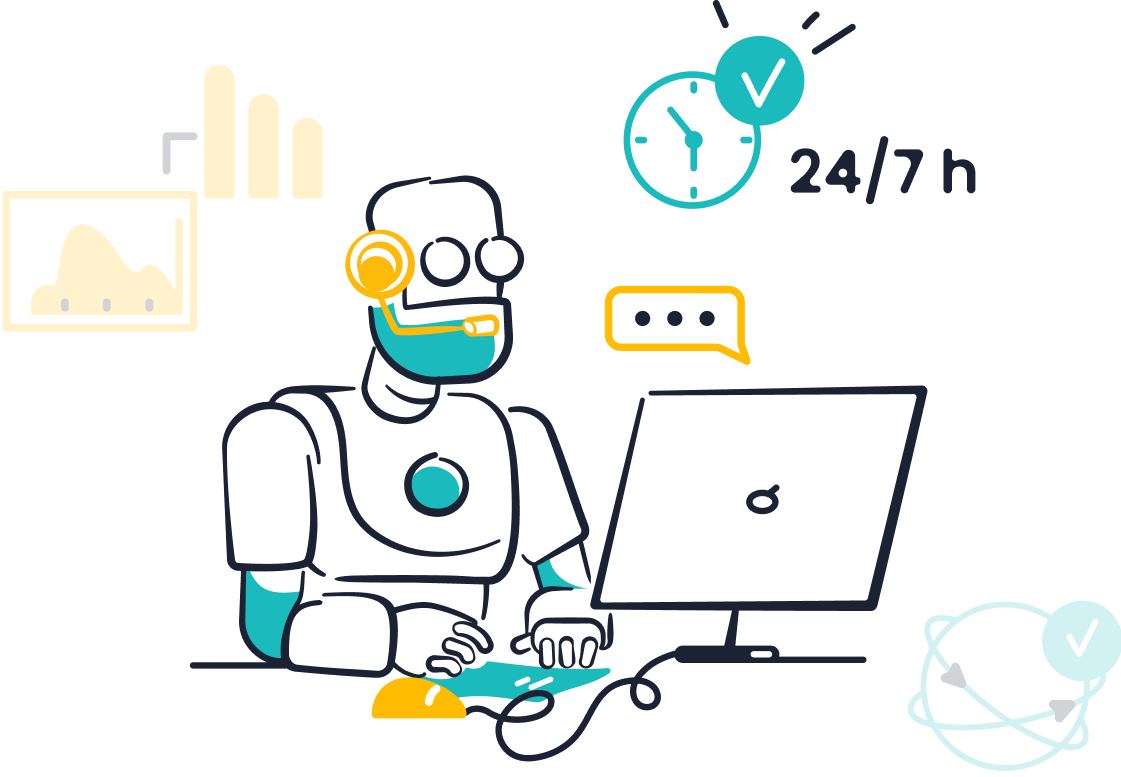
Enterprise chatbots are AI-powered tools designed to automate customer interactions and streamline business processes. These chatbots act as virtual assistants, handling tasks like answering inquiries, managing workflows, and collecting data. By reducing human errors and operating 24/7, they enhance productivity and improve customer engagement. For example, businesses using enterprise chatbots have reported up to 30% cost savings and faster resolution times, such as a Swedish payment group reducing average response time from 11 minutes to 2 minutes.
The significance of enterprise chatbots lies in their ability to transform operations. They improve data collection, enabling businesses to identify areas for growth. Tools like Sobot’s enterprise chatbot for business automation further amplify these benefits by offering multilingual support, seamless integration, and proactive messaging, making them essential for modern enterprises aiming to optimize efficiency and customer satisfaction.
What Are Enterprise Chatbots?
Definition and Key Characteristics
AI-driven conversational capabilities
Enterprise chatbots are advanced conversational tools powered by artificial intelligence (AI). They use technologies like Natural Language Processing (NLP) and Natural Language Understanding (NLU) to interpret user queries and provide context-aware responses. Unlike traditional systems, these chatbots can simulate human-like conversations, making interactions more intuitive and engaging. For example, in e-commerce, chatbots assist customers by recommending products based on their preferences, enhancing the shopping experience.
These chatbots operate 24/7, ensuring round-the-clock availability for both customers and employees. They also handle millions of simultaneous queries, making them highly scalable. By automating repetitive tasks, enterprise chatbots improve response times and reduce workloads, allowing your team to focus on more complex challenges.
Integration with enterprise systems like CRM and ERP
Enterprise chatbots seamlessly integrate with critical business tools such as Customer Relationship Management (CRM) and Enterprise Resource Planning (ERP) systems. This integration enables them to access and update customer data, manage workflows, and provide real-time insights. For instance, a chatbot integrated with a CRM can instantly retrieve customer purchase history to personalize recommendations.
Sobot’s AI-powered chatbot exemplifies this capability. It connects with platforms like Salesforce and SAP, ensuring smooth data flow and efficient operations. This level of integration not only enhances productivity but also ensures data accuracy across systems.
How Enterprise Chatbots Differ from Regular Chatbots
Advanced scalability and customization
Enterprise chatbots are designed to handle large-scale operations. They support horizontal and vertical scaling, ensuring high availability even during peak usage. Additionally, they offer extensive customization options, allowing you to tailor workflows and responses to meet specific business needs.
Enhanced security and compliance for businesses
Security is a top priority for enterprise chatbots. They adhere to strict compliance standards like GDPR, HIPAA, and PCI DSS. Features such as multi-factor authentication and role-based access control protect sensitive data. For example, Sobot’s chatbot ensures secure interactions through encrypted data flows and audit trails, making it ideal for industries with stringent regulations.
Tailored solutions for enterprise-level needs
Unlike regular chatbots, enterprise chatbots provide solutions tailored to complex business environments. They support multilingual capabilities, enabling global operations. They also offer intelligent fallback mechanisms, ensuring seamless escalation to human agents when needed. This adaptability makes them indispensable for enterprises aiming to enhance customer satisfaction and operational efficiency.
The Role of Enterprise Chatbots in Business Automation

Automating Repetitive Tasks
Streamlining customer inquiries and support
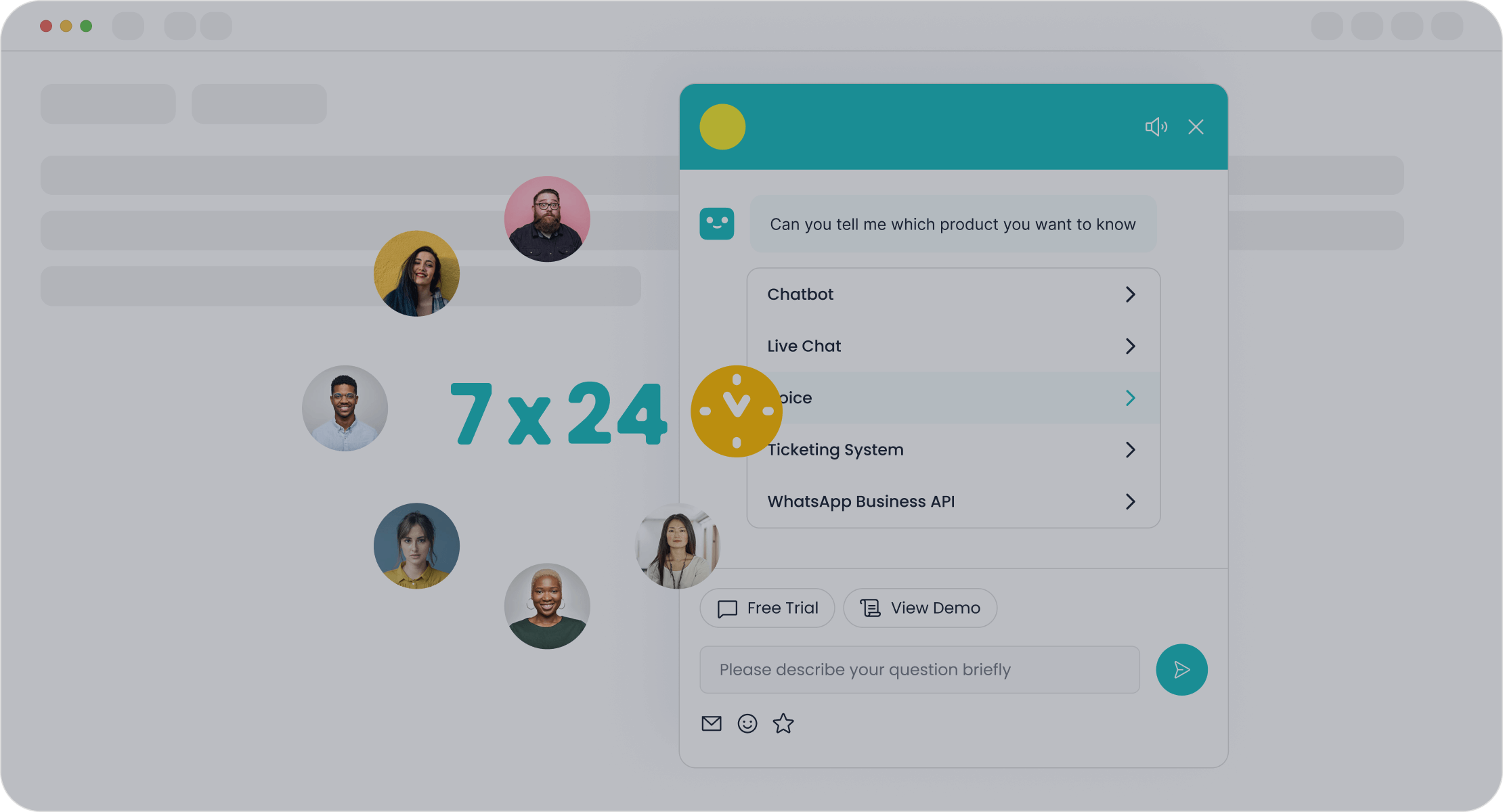
Enterprise chatbots excel at handling repetitive customer service tasks, such as answering FAQs, tracking orders, and resolving basic issues. These chatbots reduce the workload on human agents, allowing them to focus on complex queries. For instance, Sobot’s AI-powered chatbot operates 24/7, ensuring customers receive instant responses, even during peak hours. This automation improves customer engagement and satisfaction while cutting operational costs.
| Metric | Value |
|---|---|
| Average weekly users | 120K |
| Containment rate of streaming flows | 80% |
| Improvement in subscription rate | +46% |
| Increase in payments processed/month | 1,000% |
These metrics highlight the efficiency of enterprise chatbots in automating customer interactions, making them indispensable for modern businesses.
Managing routine HR and IT requests
Enterprise chatbots streamline internal process automation by managing routine HR and IT tasks. They assist employees with leave requests, payroll inquiries, and password resets. For example, a chatbot integrated into an HR system can instantly provide information about company policies or benefits. This automation reduces response times and enhances employee satisfaction. Sobot’s chatbot simplifies these processes with its intuitive interface and seamless integration capabilities, ensuring smooth operations across departments.
Enhancing Workflow Efficiency
Reducing response times with 24/7 availability
Chatbots operate round-the-clock, ensuring immediate responses to inquiries. This availability reduces response times significantly, enhancing customer experience. Analytics from chatbot interactions reveal inefficiencies like slow replies or high dropout rates. Businesses can use this data to optimize workflows, improving user satisfaction and reducing costs.
| Metric | Description |
|---|---|
| User Engagement | Measures how actively users interact with the chatbot. |
| Response Times | Tracks the speed at which the chatbot replies to user inquiries. |
| Resolution Rates | Indicates the percentage of queries successfully resolved by the chatbot. |
| Cost Reductions | Assesses the decrease in operational costs due to chatbot implementation. |
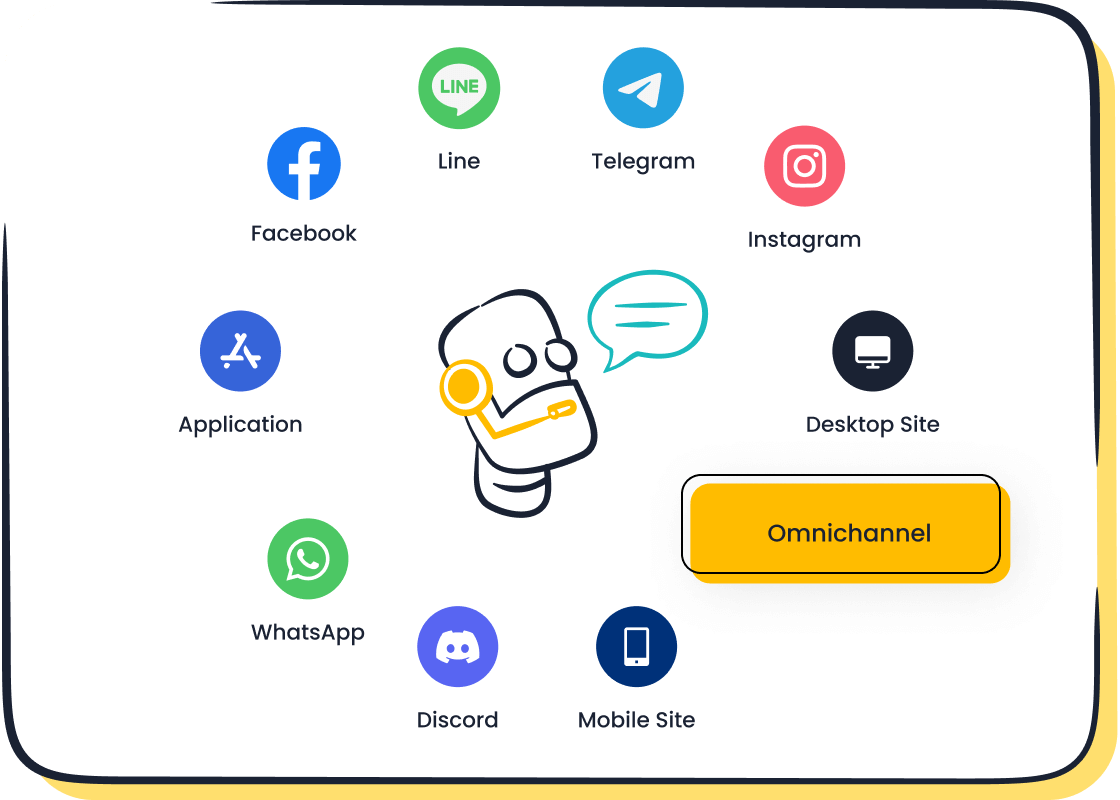
Enabling seamless omnichannel communication
Enterprise chatbots unify communication across multiple platforms, including social media, websites, and messaging apps. This omnichannel approach ensures customers can interact with your business through their preferred channels. Sobot’s chatbot supports platforms like WhatsApp and SMS, providing consistent and personalized experiences. By integrating these channels, you enhance customer engagement and streamline operations.
Supporting Data-Driven Business Strategies
Collecting and analyzing customer data
Enterprise chatbots collect valuable customer data during interactions. This data helps businesses understand user preferences, behavior, and pain points. For example, Sobot’s chatbot uses AI to analyze conversations and generate actionable insights. These insights enable you to refine strategies and improve customer service.
Providing actionable insights for decision-making
Chatbots transform raw data into meaningful insights, helping businesses make informed decisions. They identify trends, predict customer needs, and optimize workflows. Automation becomes a game-changer when chatbots handle repetitive tasks like appointment scheduling and order tracking. This frees employees to focus on strategic initiatives, driving growth and efficiency.
Key Benefits of Enterprise Chatbots
Improved Customer Experience
Faster and more personalized interactions

Enterprise chatbots transform customer service by delivering faster and more personalized interactions. These chatbots use AI to analyze customer preferences and provide tailored responses instantly. For example, Sobot’s chatbot integrates with CRM systems to access customer data, enabling personalized customer service. This approach not only reduces wait times but also enhances customer satisfaction. Businesses using enterprise chatbots report improved customer engagement and loyalty due to these personalized experiences.
Proactive engagement through smart self-service
Chatbots excel at proactive engagement by offering smart self-service options. They anticipate customer needs and provide solutions before issues arise. For instance, a chatbot can notify customers about order delays or suggest relevant products based on browsing history. Sobot’s chatbot takes this a step further with proactive push messaging, boosting customer engagement and lead generation by 20%. This proactive approach ensures customers feel valued and supported throughout their journey.
Cost Efficiency
Reducing operational costs with automation
Enterprise chatbots significantly reduce operational costs by automating routine tasks. Klarna’s AI-powered chatbot handled 2.3 million conversations in one month, equivalent to the workload of 700 agents. This automation reduced resolution times from 11 minutes to under 2 minutes, saving millions in labor costs. Additionally, chatbots free up human agents to focus on complex tasks, further enhancing efficiency.
| Cost Category | Average Savings | Impact |
|---|---|---|
| Support Costs | 30% reduction | Automates routine inquiries effectively |
| Labor Hours | 2.5 billion (2023) | Frees up significant time across industries |
| Agent Productivity | 50% increase | Boosts efficiency on a large scale |
Minimizing the need for additional human agents
Chatbots operate 24/7, reducing the need for additional staff during peak hours. This scalability ensures consistent customer service without increasing labor costs. Sobot’s chatbot, for example, autonomously handles inquiries, saving up to 50% on agent-related expenses. By minimizing the reliance on human agents, businesses can allocate resources more effectively.
Scalability and Flexibility
Adapting to growing business demands
Enterprise chatbots adapt to growing business demands by scaling operations effortlessly. They handle high volumes of interactions without compromising performance. Cloud-based chatbots, which captured over 58.4% of the market share in 2024, are particularly effective in scaling operations across industries. Sobot’s chatbot supports omnichannel communication, ensuring seamless customer interactions as your business expands.
Supporting multilingual and global operations
Chatbots enable businesses to operate globally by supporting multiple languages. This capability ensures consistent customer experiences across regions. Large enterprises, which held over 70.5% of the chatbot market share in 2024, rely on this feature to manage complex operations. Sobot’s chatbot, for instance, offers multilingual support, making it an ideal solution for businesses targeting international markets.
Practical Use Cases of Enterprise Chatbots
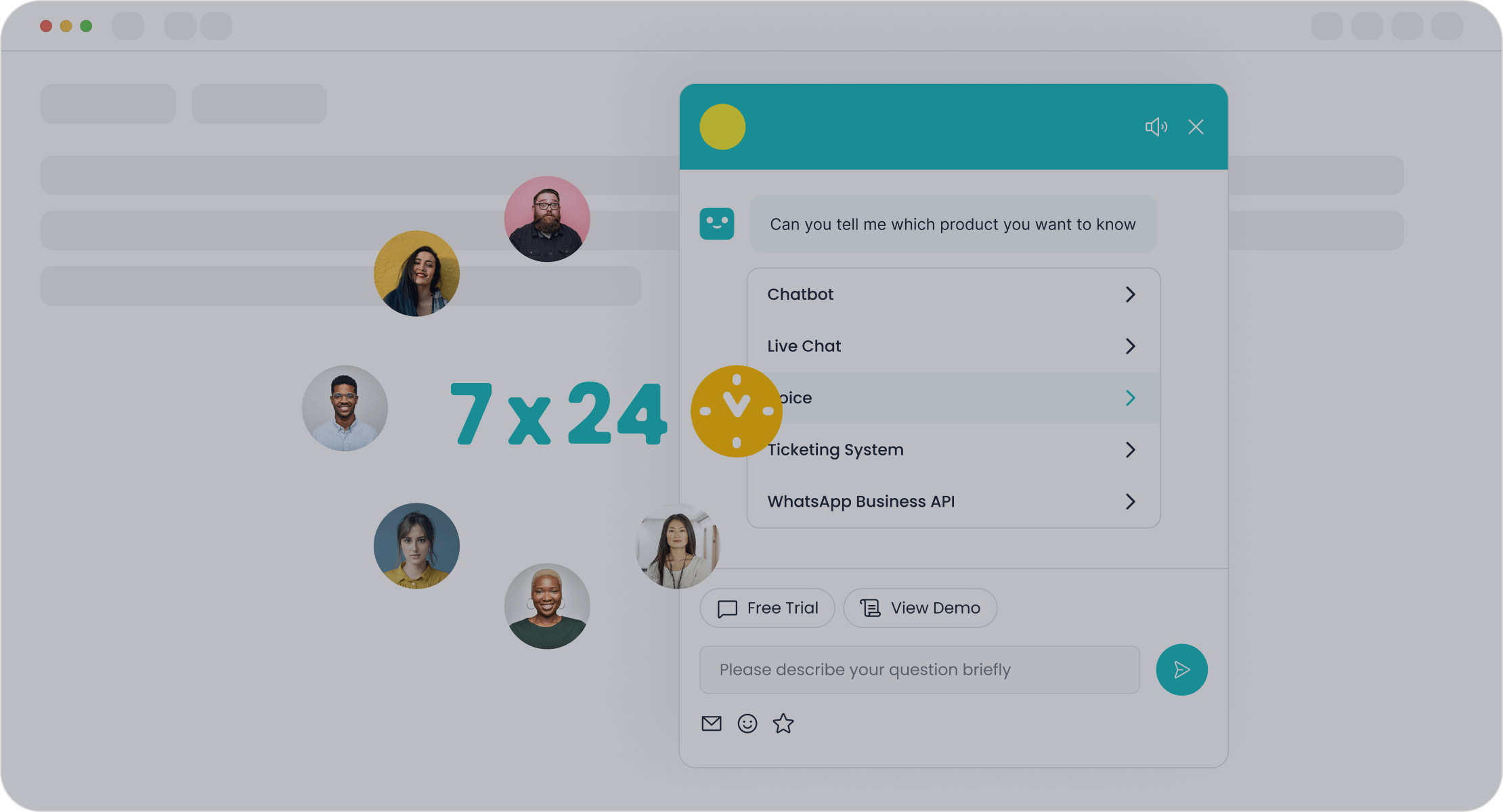
Customer Support
Resolving FAQs and escalating complex queries
Enterprise chatbots excel in customer service by automating responses to frequently asked questions (FAQs). They handle tasks like order tracking, account updates, and troubleshooting common issues. For example, a B2B SaaS company implemented a chatbot and achieved a 70% deflection rate, reducing the workload on human agents. When complex queries arise, chatbots seamlessly escalate them to the appropriate team, ensuring efficient resolution. This dual capability enhances customer support capabilities while maintaining high service quality.
Enhancing customer satisfaction with 24/7 availability
Chatbots operate round-the-clock, eliminating wait times and ensuring immediate responses. This availability significantly improves the customer experience. For instance, PhonePe automated 60% of customer queries, enhancing response speed and accuracy. Sobot’s enterprise chatbot for business automation offers 24/7 support across multiple channels, ensuring consistent engagement and satisfaction.
Human Resources
Assisting with employee onboarding and training
Enterprise chatbots simplify HR processes by assisting with onboarding and training. They provide instant access to company policies, training materials, and FAQs, helping new employees adapt quickly. Chatbots also guide employees through compliance training, ensuring they meet organizational standards. This automation reduces the time HR teams spend on repetitive tasks, allowing them to focus on strategic initiatives.
Managing leave requests and payroll inquiries
Chatbots streamline HR operations by automating leave requests and payroll inquiries. Employees can check leave balances, submit requests, or inquire about payroll details through a chatbot. This self-service approach improves efficiency and reduces errors. Sobot’s chatbot integrates seamlessly with HR systems, enabling accurate and real-time responses to employee queries.
Sales and Marketing
Generating and qualifying leads

Chatbots play a pivotal role in lead generation by engaging website visitors and collecting valuable data. They qualify leads by asking targeted questions and evaluating user responses. Metrics like engagement rate and lead qualification score help businesses identify high-value prospects. For example, Sobot’s chatbot uses proactive messaging to boost lead generation by 20%, ensuring a steady pipeline of potential customers.
Providing personalized product recommendations
Chatbots enhance sales conversion by offering personalized product recommendations. They analyze user behavior and preferences to suggest relevant products, creating a tailored shopping experience. In e-commerce, this capability drives higher engagement and increases sales. Sobot’s chatbot integrates with CRM systems to deliver accurate recommendations, improving customer satisfaction and loyalty.
| Industry/Application | Description |
|---|---|
| Customer Service | Automating support for FAQs, tracking orders, and resolving common queries. |
| HR and Employee Support | Handling leave requests, onboarding processes, and answering HR-related questions. |
| E-commerce and Sales | Assisting with product recommendations, guiding through the purchase process, and offering promotions. |
IT Support
Troubleshooting technical issues
Chatbots have revolutionized IT support by efficiently managing common technical problems. They handle tasks like diagnosing connectivity issues, guiding users through software installations, and resolving hardware-related queries. These digital assistants provide instant solutions, reducing downtime and improving productivity. For example, an enterprise chatbot can guide employees step-by-step to troubleshoot printer malfunctions, eliminating the need for IT intervention.
Enterprise chatbots also initiate ticketing processes when issues require escalation. This ensures that IT teams receive detailed problem descriptions, enabling faster resolutions. By automating these repetitive tasks, chatbots allow IT departments to focus on complex challenges, fostering innovation and collaboration.
Automating password resets and access requests
Password resets and access requests are among the most frequent IT inquiries. Chatbots streamline these processes by automating them. Employees can interact with a chatbot to reset passwords or request access to specific systems. This automation eliminates delays caused by manual approvals.
For instance, Sobot’s enterprise chatbot simplifies password management with its intuitive interface. It verifies user identity securely and processes requests instantly. This reduces the workload on IT teams and enhances employee satisfaction. Chatbots also maintain detailed logs of these interactions, ensuring compliance with security protocols.
Sobot Chatbot in Action
Case Study: Agilent's sixfold efficiency improvement
Agilent, a leader in life sciences, faced challenges in managing high volumes of customer inquiries. By integrating Sobot’s enterprise chatbot, Agilent transformed its customer service operations. The chatbot handled routine inquiries, allowing human agents to focus on complex issues. This resulted in a sixfold increase in efficiency and a 25% reduction in costs.
The chatbot’s omnichannel capabilities enabled seamless communication across platforms, enhancing customer satisfaction. Agilent achieved a 95% satisfaction score, showcasing the impact of Sobot’s solution. This case study highlights how enterprise chatbots drive efficiency and improve service quality.
How Sobot Chatbot enhances customer service
Sobot’s chatbot offers advanced features like 24/7 availability, multilingual support, and seamless integration with enterprise systems. These capabilities ensure consistent and personalized customer interactions. The chatbot also uses AI to analyze conversations, providing actionable insights for decision-making.
For example, Sobot’s chatbot proactively engages customers with smart self-service options. It resolves FAQs, tracks orders, and escalates complex queries to human agents when necessary. This approach not only reduces response times but also boosts customer satisfaction. Businesses using Sobot’s chatbot report significant improvements in efficiency and engagement, making it an essential tool for modern enterprises.
How to Implement Enterprise Chatbots
Define Business Goals and Use Cases
Identify tasks suitable for automation
Start by identifying repetitive tasks that consume significant time and resources. These tasks often include answering FAQs, managing appointment scheduling, or processing routine HR requests. For example, an enterprise chatbot for business automation can handle customer inquiries 24/7, reducing the workload on human agents. Begin with 5-10 key services that are frequently requested and easily automated. This approach ensures a focused implementation that delivers measurable results.
Align chatbot capabilities with business objectives
Aligning chatbot functionalities with your business goals ensures a targeted and effective deployment. Define specific objectives, such as improving customer satisfaction, driving lead generation, or reducing operational costs. For instance, Sobot’s AI-powered virtual assistants integrate seamlessly with CRM systems to enhance customer interactions and streamline workflows. The table below highlights the importance of aligning chatbot capabilities with business outcomes:
| Evidence | Description |
|---|---|
| Customization | Chatbots must reflect the brand’s voice and aesthetics to create a consistent user experience. |
| Performance Metrics | Establishing specific objectives aligned with business goals ensures focused tracking of relevant metrics. |
| Strategic Deployment | Guiding chatbot deployment with clear outcomes can lead to significant business gains. |
Choose the Right Platform and Technology
Evaluate chatbot development platforms like Sobot
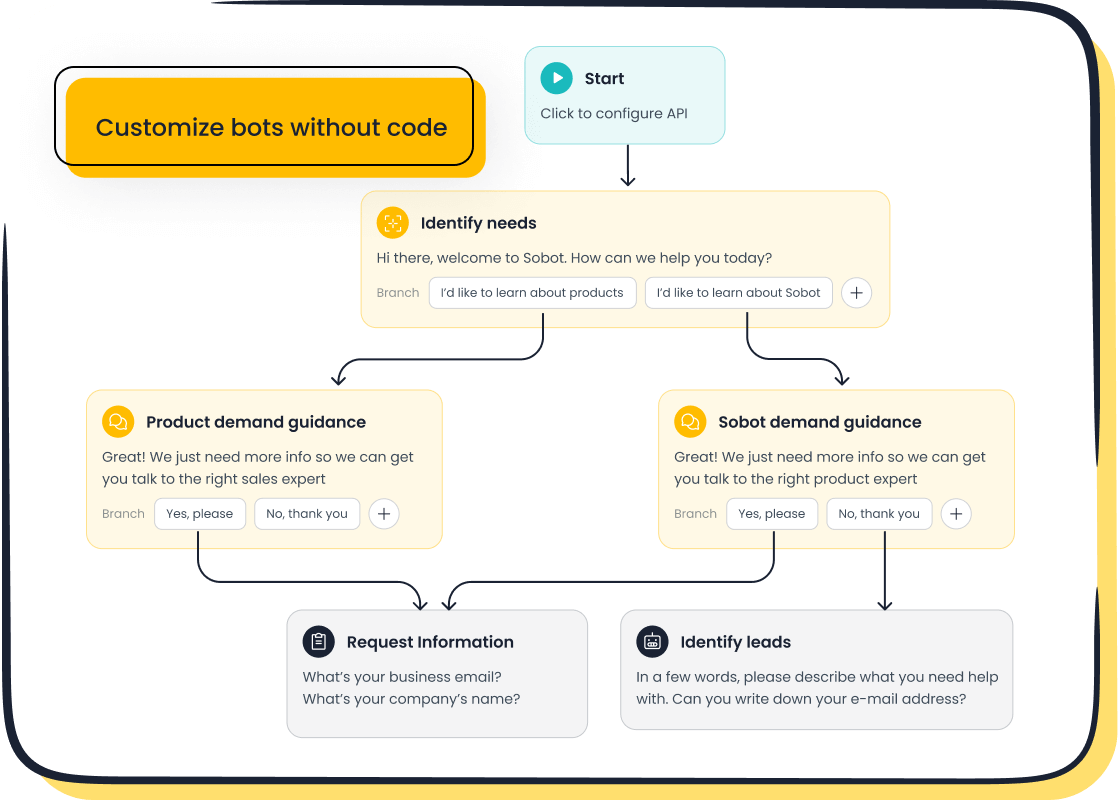
Selecting the right enterprise chatbot platforms is crucial for success. Look for platforms that offer advanced features such as multilingual support, integration with internal systems, and robust security measures. Sobot’s chatbot solutions stand out by providing omnichannel support and a no-coding-required setup, making it accessible for businesses of all sizes. These platforms also utilize conversational AI to deliver personalized customer experiences, ensuring your chatbot aligns with your business operations.
Ensure seamless integration with existing systems
Your chatbot must integrate smoothly with existing tools like CRM, ERP, or HR systems. This integration allows the chatbot to access and update data in real-time, improving efficiency. For example, Sobot’s chatbot connects with platforms like Salesforce and SAP, enabling unified workflows and accurate data management. A well-integrated chatbot enhances productivity and ensures a seamless user experience across all touchpoints.
Develop and Test the Chatbot
Train the chatbot using relevant data
Training your chatbot with accurate and comprehensive data is essential for success. Use historical customer interactions, FAQs, and product information to build a robust knowledge base. Sobot’s AI chatbots for businesses utilize deep learning algorithms to classify intent and understand context, improving conversational skills over time. This continuous learning ensures your chatbot delivers accurate and context-aware responses, enhancing customer satisfaction.
Conduct rigorous testing for accuracy and reliability
Before deployment, test your chatbot extensively to ensure it performs as expected. Evaluate its ability to handle various scenarios, including complex queries and high user volumes. Testing should also focus on the chatbot’s ability to maintain consistent performance across different channels. For example, Sobot’s chatbot undergoes rigorous testing to ensure reliability, scalability, and security. This process guarantees a smooth implementation that meets your business automation goals.
Monitor and Optimize Performance
Use analytics to track and improve performance
Tracking chatbot performance is essential for ensuring its effectiveness. Analytics provide valuable insights into how users interact with chatbots, helping you identify areas for improvement. Key performance indicators (KPIs) such as user engagement, response accuracy, and resolution rates reveal how well your chatbot meets customer needs. For example, a high customer satisfaction (CSAT) score indicates positive user experiences, while a low score highlights areas requiring attention.
To optimize performance, focus on analyzing trends and patterns in chatbot interactions. Metrics like conversation drop-off rates and average response times can uncover inefficiencies in the conversation flow. Businesses using Sobot’s AI-powered chatbots benefit from detailed analytics dashboards that track these KPIs in real-time. This data-driven approach allows you to refine chatbot strategies, ensuring better customer experiences and higher conversion rates.
Continuously update the chatbot for evolving needs
Chatbots must evolve to meet changing customer expectations and business goals. Regular updates ensure your chatbot remains relevant and effective. Start by reviewing customer feedback and interaction data to identify gaps in the chatbot’s knowledge base. For instance, if users frequently ask questions the chatbot cannot answer, updating its database with relevant information can improve response accuracy.
Sobot’s chatbots simplify this process with their intuitive interfaces and no-coding-required setup. You can easily add new workflows, update FAQs, or integrate additional features to enhance functionality. Additionally, leveraging AI capabilities ensures the chatbot learns from past interactions, improving its ability to handle complex queries over time. Continuous optimization not only boosts customer satisfaction but also ensures your chatbot aligns with your business objectives.
Tip: Schedule regular performance reviews to keep your chatbot aligned with evolving customer needs and industry trends.
Enterprise chatbots have revolutionized business automation, delivering measurable benefits across industries. They enhance customer support by providing instant responses 24/7, automate repetitive tasks to improve operational efficiency, and reduce costs by minimizing the need for large support teams. Their scalability allows businesses to handle thousands of queries effortlessly, while their adaptability ensures alignment with diverse needs.
| Benefit | Impact |
|---|---|
| Enhanced Customer Support | Provides instant responses 24/7, reduces wait times, and improves customer satisfaction. |
| Improved Operational Efficiency | Automates repetitive tasks, freeing employees for higher-value work and reducing errors. |
| Cost Reduction | Cuts operational costs and reduces the need for large customer support teams. |
| Scalability and Flexibility | Easily scales to handle thousands of queries and adapts to different business needs. |
| Better Lead Generation and Sales Conversion | Engages visitors, qualifies leads in real-time, and automates follow-ups. |
| Reduction in Operating Expenses | More than a 30% reduction in operating expenses observed due to automation. |
Adopting solutions like Sobot Chatbot amplifies these advantages. Its AI-powered capabilities streamline workflows, boost customer satisfaction, and drive efficiency. As businesses embrace digital transformation, enterprise chatbots will play a pivotal role in shaping smarter, more connected operations. Their ability to integrate with systems like CRM and ERP ensures they remain indispensable tools for modern enterprises.
FAQ
What industries benefit the most from enterprise chatbots?
Industries like retail, finance, healthcare, and education gain the most from enterprise chatbots. For example, retail businesses use AI-powered chatbots to recommend products, while financial services automate customer interactions for account inquiries. Sobot’s chatbot supports diverse industries, including manufacturing and gaming, enhancing business automation and customer satisfaction.
How do enterprise chatbots improve customer interactions?
Enterprise chatbots provide instant, personalized responses, ensuring faster resolutions. They operate 24/7, reducing wait times and enhancing customer satisfaction. Sobot’s AI-powered chatbot integrates with CRM systems to access customer data, delivering tailored experiences that improve engagement and loyalty.
Can enterprise chatbots handle multilingual communication?
Yes, enterprise chatbots support multiple languages, enabling global operations. Sobot’s chatbot, for instance, interacts with customers in their preferred language, ensuring consistent service worldwide. This feature is essential for businesses targeting international markets and aiming to enhance customer interactions.
Are enterprise chatbots secure for business automation?
Enterprise chatbots prioritize security with features like data encryption and compliance with standards like GDPR. Sobot’s chatbot ensures secure customer interactions through encrypted data flows and role-based access control, making it ideal for industries with strict regulations.
How does Sobot’s chatbot enhance business automation?
Sobot’s AI-powered chatbot automates repetitive tasks like answering FAQs and managing workflows. It operates 24/7, saving up to 50% on agent costs. Its seamless integration with enterprise systems like CRM and ERP ensures efficient operations, making it a valuable tool for business automation.
See Also
Enhancing Customer Satisfaction in E-commerce with Chatbots
Tips for Selecting the Ideal Chatbot Software
Simple Ways to Integrate Chatbots on Your Website